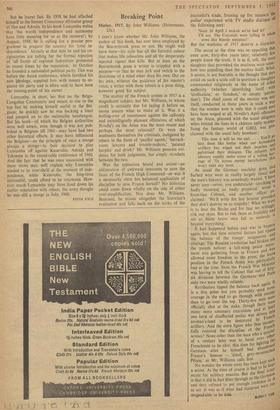Breaking Point
DON'T know whether Mr. John Williams, the author of this book, has ever been employed by
the Beaverbrook press or not. He might well have been—his style has all the forceful colour that makes life colourless and all the desperately injected vigour that kills. But at least on the Beaverbrook press a writer is crippled with a purpose—so that he may jerk and twitch to the directions of a mind other than his own. Out on his own, without the guidance of his master's voice, a writer with these talents is a poor thing, however good his subject.
The mutiny of the French armies in 1917 is a magnificent subject, but Mr. Williams, to whom credit is certainly due for laying it before us, seems unsure what to make of it. Was it a boiling-over of resentment against the callously and unintelligently planned offensives, of which Nivelle's on the Aisne was the most recent and perhaps the most criminal? Or were the mutineers themselves the criminals, instigated by others in the form of 'pacifist agents,' barrack- room lawyers and trouble-makers,' painted harpies' and drink? Mr. Williams presents evi- dence for both judgments, but simply ricochets between the two.
Was the repression brutal and unjust—an obliteration of awkward innocents to save the faces of the French High Command—or was it a necessarily stern but balanced application of discipline to save France herself? No historian could come down wholly on the side of either over-simplification. Nor does Mr. Williams. Bemused, he misses altogether the historian's evaluation and falls back on the tricks of the SPECTATOR. SEPTEMBER 7, 1 962 journalist's trade, livening up for instance the poilus' experience with TV studio dialogue of the following sort:
'Since 16 April 1 reckon we've had it!'
'I'll say. The Colonials were falling in whole rows like bloody ninepins!'
But the mutinies of 1917 deserve a historian.
The secret at the time was so appalling that even now, forty-five years later, relatively feW people know the truth. It is as if, still, the mass slaughter that provoked the mutinies were some' how less appalling than the mutiny itself. What' it seems, is not bearable is the thought that men could on such a scale call in question a slaughter commanded religiously in the name of tribal authority (whether identifying itself with 'civilisation,' or 'freedom,' or simply 'patrio- tism'). The chief cause of the mutiny was war itself, conducted in those years in such a way that the wonder now is only that it could ever have been waged at all. Nivelle's April offensive on the Aisne, planned with the usual diligence miles behind the lines in a château aptly symbo- lising the fantasy world of GHQ, was pro. claimed with the usual holy bombast: This time it will be the end. . . . You'll g° into them like butter when our formidable artillery has wiped out their trenches an,", pulverised their defences. The infantry win advance rapidly under cover of a rolling bar' rage 5sacroossenemy installations that rwaone o won't exist 7 xtst any more. As usual the German machine guns and, barbed wire were in reality largely intact and the men's bravery was senselessly wasted. `1 have never seen—never, you understand—anything so badly mounted, so badly prepared,' wrote a front-line Colonel, and another officer ex- claimed : 'We'll settle for less honour provided they don't destroy us so stupidly! What we want is to beat the Boche and for that we willingly risk our skins. But to risk them so foolishly and see so Many brave men fall so uselessly Is beyond eyerything.' It had happened before and was to haPPc11, again, but this time external factors just tipPea, the balance of the troops' resignation atla, courage. The Russian revolution had broken out the month before; a left-wing peace move- ment was gathering force in France and was allowed some freedom in the press; the l. position in the French Army was particularly bad at the time. Soon the French War Minister was having to tell the Cabinet that out of fifty- six divisions between the Germans and Paris
only two were wholly reliable. It
Retribution tipped the balance back again. is a fine point but you probably need 111°J., courage in the end to go through with ntutelure than to go over the top. Thirty-five men w_„,. officially shot at the stake, though there were officially more summary executions and at le.pto one herd of disaffected poitus was driven no-man's-land to be destroyed by Fre 11;s artillery. And the stern figure who thus succerich fully restored the discipline of the Fre ter armies? None other than the man who a quay of a century later was to hand over &hit:: Frenchmen to be shot, this time for fighting fled Germans after he himself had abandon France's honour — 'aloof, grey-moustached Pdtain,' as Mr. Williams calls him. kept such No wonder the whole story has been kep _ a secret. At the time of course it had to be irony secret for military reasons. But the fina is that it did in fact filter through to the Germans they refused to put enough credence Ito
o


































 Previous page
Previous page